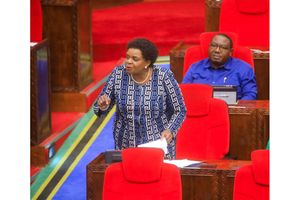EAC official blames weak border controls for rise in crimes

(EAC) deputy secretary general in charge of Political Federation Charles Njoroge.
What you need to know:
He said the situation was compounded by limited resources, limited anti-trafficking experiences as well as limited inter-agency cooperation.
Arusha. Corruption and weak border controls are to blame for hindrances to anti-drug and human trafficking efforts in East Africa, according to East African Community (EAC) deputy secretary general in charge of Political Federation Charles Njoroge.
He said the situation was compounded by limited resources, limited anti-trafficking experiences as well as limited inter-agency cooperation.
“Today, more women from the region are being trafficked than men,” said Mr Njoroge.
Speaking at a joint workshop on Countering Human and Drug Trafficking in the region that is taking place in Zanzibar, he said drug barons were also targeting unsuspecting women to be carriers of narcotic drugs.
“In some cases, the two crimes are committed jointly and concurrently, whereby the very women transporting the drugs are at the same time trafficked,” he said, according to a dispatch sent to The Citizen. The seven-day training workshop has been jointly organised by the EAC in collaboration with Interpol, the international police organisation.
It aims at increasing knowledge for investigators involved in curbing the two transnational organised crimes (TNOCs) in the region, through sharing the best practices to tackle them.
Among the matters to come under scrutiny are the changing dynamics in drug and human trafficking in the region.
The workshop is expected to come out with practical strategies “that would better facilitate efforts towards countering the two crimes”.
In addition to the two crimes, the EAC is investing in addressing terrorism through establishment of Inter-religious Council whose mandate is to address the radicalization of youth in the region.
The initiative is funded through the Africa Peace and Security Architecture (Apsa) Support Programme, which has been working with the EAC on peace and security activities.
Besides the joint transnational crime fight, the EAC is set to establish a Regional Forensic Referral Centre in Kampala, Uganda within the framework of peace and security initiatives with the support of Interpol.
Establishment of the centre falls in line with the regional strategy to jointly combat terrorism.




